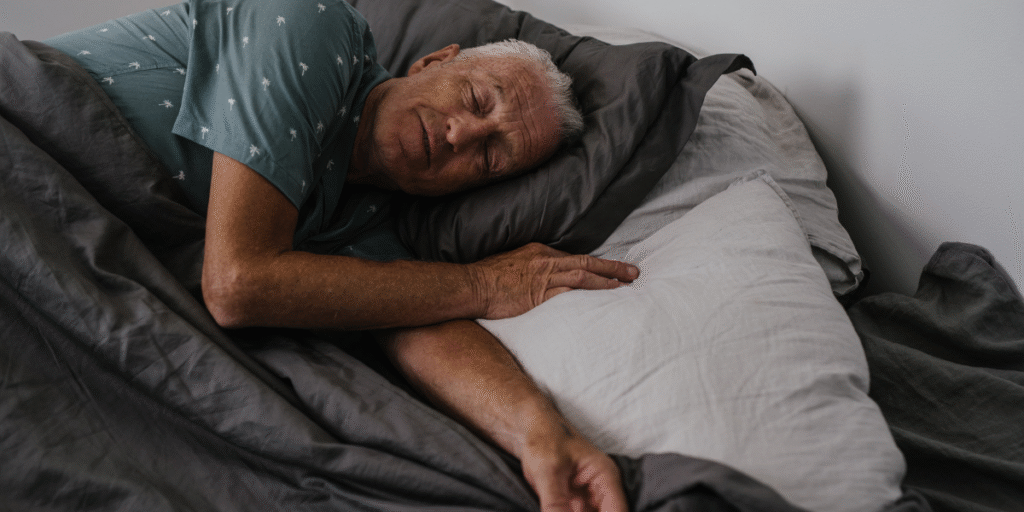Sleep plays a vital role in maintaining physical and mental health at every stage of life. However, as people age, sleep patterns often change, leading to difficulty falling asleep, staying asleep, or achieving restful sleep. Elderly individuals may experience insomnia, restless nights, or early waking, which can affect overall well-being. Fortunately, there are effective ways to manage sleep problems in older adults, combining healthy habits, lifestyle changes, and medical support when necessary.
Common Causes of Sleep Problems in the Elderly
Before looking at solutions, it’s important to understand why older adults struggle with sleep. Some common causes include:
- Natural aging changes: The body’s internal clock shifts, leading to earlier bedtimes and wake-up times.
- Medical conditions: Arthritis, diabetes, cardiovascular issues, or respiratory problems can cause discomfort and disrupt sleep.
- Medications: Certain prescriptions may cause insomnia or restlessness as side effects.
- Mental health: Stress, anxiety, or depression can interfere with restful sleep.
- Lifestyle factors: Reduced physical activity, excessive daytime naps, or caffeine consumption late in the day can contribute to sleep difficulties.
Effective Ways to Improve Sleep in Older Adults
1 Maintain a Consistent Sleep Schedule
Encourage elderly individuals to go to bed and wake up at the same time every day. A regular schedule helps regulate the body’s circadian rhythm, making it easier to fall asleep and wake up naturally.
2 Create a Restful Sleep Environment
A calm and comfortable bedroom can make a big difference. Ensure the room is quiet, dark, and at a comfortable temperature. Using blackout curtains, earplugs, or white noise machines may help reduce disturbances. A supportive mattress and pillows designed for comfort can also improve sleep quality.
3 Encourage Physical Activity
Daily exercise such as walking, yoga, or light stretching promotes better sleep. Physical activity helps reduce stress, improves mood, and makes it easier to fall asleep at night. However, exercising too close to bedtime should be avoided, as it may increase alertness.
4 Limit Daytime Napping
Short naps can be refreshing, but long or frequent naps may disrupt nighttime sleep. If napping is necessary, it should be limited to 20–30 minutes earlier in the day.
5 Monitor Diet and Hydration
Caffeine, alcohol, and nicotine can interfere with sleep and should be minimized, especially in the evening. A light, balanced dinner is preferable over heavy meals at night. Staying hydrated throughout the day is important, but reducing fluid intake before bedtime can help prevent frequent nighttime bathroom trips.
6 Practice Relaxation Techniques
Relaxation strategies such as deep breathing, meditation, or listening to soothing music can calm the mind and body before sleep. Some elderly individuals may also find reading a book or practicing gentle stretches helpful in unwinding at the end of the day.
7 Manage Underlying Health Conditions
Sleep problems are often linked to health issues such as chronic pain, sleep apnea, or restless leg syndrome. Consulting a healthcare provider for proper diagnosis and treatment can significantly improve sleep quality.
8 Review Medications with a Doctor
If sleep problems began after starting a new medication, it’s worth discussing alternatives or adjustments with a healthcare professional. Sometimes simple changes in dosage or timing can reduce sleep disturbances.
9 Exposure to Natural Light
Spending time outdoors or near a sunny window helps regulate the body’s sleep-wake cycle. Natural light exposure during the day promotes better nighttime sleep.
10 Cognitive Behavioral Therapy for Insomnia (CBT-I)
For elderly individuals struggling with chronic insomnia, CBT-I is a proven approach. It focuses on changing negative thoughts and behaviors related to sleep while promoting healthier patterns.
When to Seek Medical Help?
Occasional sleepless nights are common, but persistent sleep issues should not be ignored. Poor sleep can increase the risk of falls, memory problems, mood disorders, and weakened immunity in older adults. If sleep problems continue despite lifestyle changes, seeking professional medical advice is essential.
Conclusion
Sleep problems in the elderly are common but manageable. By promoting healthy routines, addressing underlying causes, and creating a supportive sleep environment, older adults can enjoy better rest and improved quality of life. Family members and caregivers also play a vital role in encouraging healthy sleep practices. With patience and the right strategies, restful nights are within reach.

